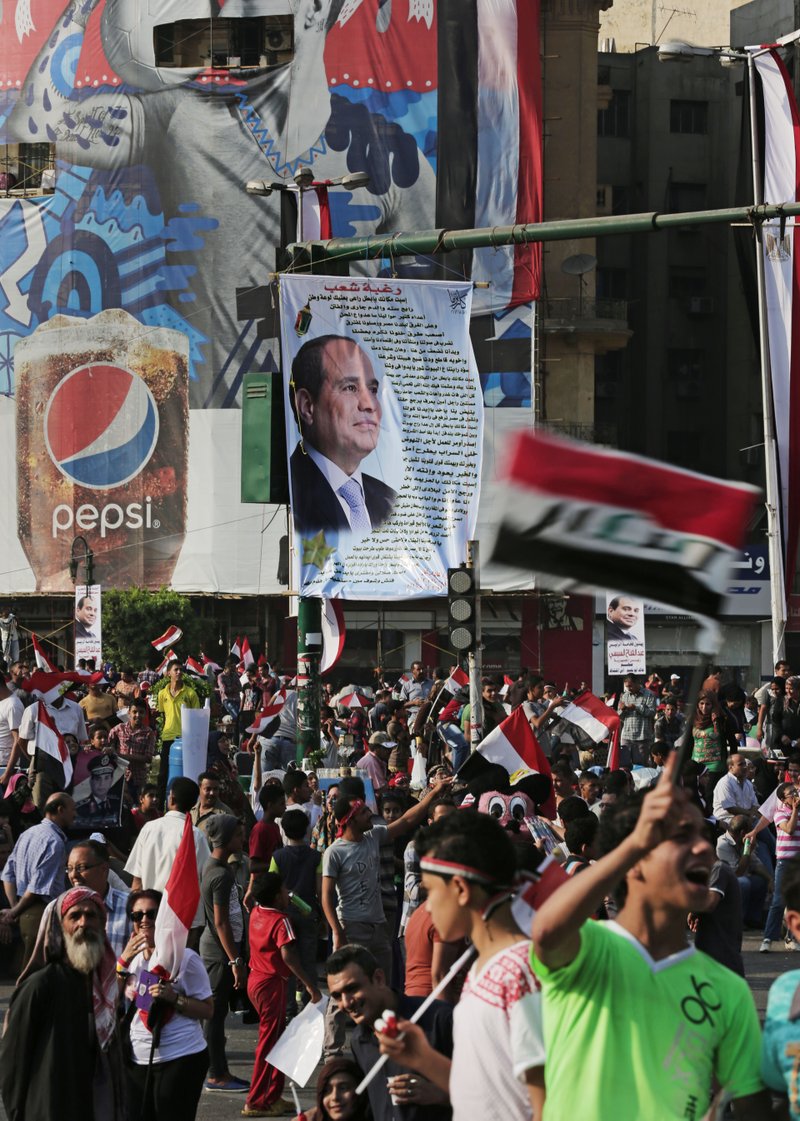CAIRO -- Egyptian police on Monday arrested seven men in the sexual assault of a 19-year-old student during celebrations marking the inauguration of the country's president the day before in Cairo's Tahrir Square, security officials said.
Police were investigating 27 complaints of sexual harassment against women in Tahrir Square, where tens of thousands celebrated Abdel-Fattah el-Sissi's inauguration Sunday, the officials said.
In the three years since the square became the center of the 2011 uprising that ousted autocrat Hosni Mubarak, multiple sexual attacks on women have been reported amid the large crowds that have gathered there for protests, rallies or celebrations.
Last week, authorities issued a decree declaring sexual harassment a crime punishable by up to five years in prison.
But 29 women's-rights groups released a joint statement Monday accusing the government of failing do enough to address the outbreak of mob attacks on women. The groups said they had documented more than 250 cases of "mass sexual rape and mass sexual assaults" from November 2012 to January 2014.
"Combatting that phenomena requires a comprehensive national strategy," the statement said.
The seven men were arrested after an attack Sunday evening on a student, who was hospitalized afterward, the officials said. They did not elaborate on her condition and spoke on condition of anonymity because they were not authorized to speak to the media.
The Interior Ministry identified the seven men in a statement, saying their ages are between 15 and 49. It said they were arrested for "harassing several girls" but made no mention of the student. A policeman was injured while the seven were being arrested, the ministry said.
Authorities investigating other reports of sexual assaults were examining a dozen videos from security cameras or from bystanders filming with their cellphones, the officials said.
They said the footage suggested organized harassment, with groups of young men luring potential victims away from densely crowded spots before encircling and assaulting them. They said many of the harassers brandished knives that they used to threaten victims or anyone trying to rescue them.
A TV anchorman caused an uproar over her comments about the assaults during a live report by a correspondent from Tahrir. When the correspondent for al-Nahar TV told the anchorman in the studio that there had been several cases of sexual harassment, the anchorman laughed and said it's "because they are happy."
The anchorman, Maha Bahnassy, denied Monday that her comment was in response to the assaults reported by the journalist.
"I was, along with my guests, commenting on people's joy, not the harassment," she said on her Facebook page.
The anti-sexual harassment decree issued last week amended Egypt's current laws on abuse, which did not criminalize sexual harassment and only vaguely referred to such offenses as "indecent assault."
The new law says those convicted face between six months to five years in prison, with the maximum punishment reserved for offenders holding a position of power over their victims, such as when the offender is the woman's boss or is armed.
Repeat offenders would see their sentences doubled, the decree said. Along with the maximum five-year sentence, offenders can be fined up to $714.
Last year, a joint report by the United Nations Entity for Gender Equality and the Empowerment of Women, Egypt's Demographic Center and the National Planning Institute found that more than 99 percent of hundreds of women surveyed in seven of the country's 27 provinces reported experiencing some form of sexual harassment.
The breakdown in the police force in the wake of the 2011 uprising that toppled Mubarak left the streets even more unsafe for women.
Initiatives to counter harassment also multiplied. Volunteer groups started escorting women, especially during political gatherings. Activists offered self-defense classes for women, and social-networking sites launched "name and shame" campaigns.
A Section on 06/10/2014

